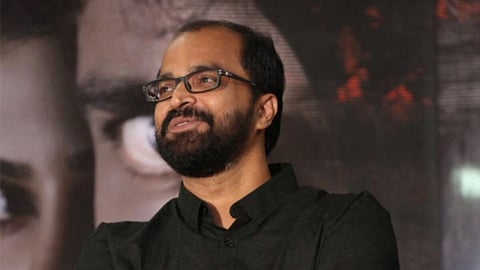

Starring Allari Naresh in the lead role, the upcoming film Aa Okkati Adakku (AOA) talks about the plight of young men and women struggling to get married. The subject is rooted in reality and relatability, and yet treated in a lighthearted manner, says veteran writer Abburi Ravi, who has penned the film’s dialogues.
Talking about his film, Ravi elaborates, “The target audience for AOA is youngsters under the age of 27. People aged 30 and above won’t listen to you. However, youngsters between the ages of 22 and 27 will pay heed to your words because this film talks about their issues.” And yet, Ravi maintains that AOA does not intend to preach. “As a character, the protagonist is sharing his frustrations, and the audience should find it relatable. It is not message oriented.”
Ravi continues to reiterate on how cinema holds a purpose beyond messaging or social commentary. He said, “We are here to make cinema, not a documentary. The filmmakers must know how serious they intend to be with their story. It’s a crucial skill. Nobody listens to their parents’ sermons, and people react the same way to movies if they become preachy. People only learn with life experiences.”
Abburi Ravi also talks about the importance of rationing humour in any story. He says, “Every story, even a comic story, has a boiling point. If it doesn’t get serious after a point, it won’t hold up. People won’t carry it home then. They should carry the film with them from the theatres. At least till the parking stand.”
Talking about Allari Naresh, Ravi says, “Naresh can do anything. We like his comedy the most, but he can perform in any kind of genre. The more you explore, the more he can deliver.” Recalling his work in Ugram, where Naresh played the lead role, Ravi says, “It’s evident in Ugram where you see him going to any length just to match the director’s vision.” He mentions that it was Allari Naresh’s idea to use the title AOA and pay homage to the namesake 1992 comedy starring Rajendra Prasad. He recalls feeling scared to use the title, adding, “We went ahead after a lot of contemplation, only after becoming sure that it suits our story. However, besides the title, there is no other connection between the two films.” Ravi also informs us that he has seen the final cut of AOA and is very happy with the final output. “The interval point and climax are rather effective. The final 15 minutes of the film's runtime form its soul.”
Ravi completes twenty years as a writer this year and has firmly established himself as one of the most reliable dialogue writers of contemporary Telugu cinema, with popular titles like Bommarillu (2006), Athidhi (2007), and Yevadu (2011) in his filmography. The writer talks at length about the essence of his job, saying, “We have to first consider what this film is trying to say and what’s the positioning of this film. We have to ask ourselves, “What is the USP of this film, and how can we enhance it?"
Ravi notes that he never feels too much pressure to work on many films at once, adding, “I need a certain amount of time and discussion to work on any film. Even for AOA, I made it clear to my producers that I need a certain amount of time and briefing to write. Otherwise, they are free to replace me.” Another important aspect to take care of while penning dialogues, Ravi notes, is the presence of an audience surrogate in the film. “Throughout the story, a regular audience member is filled with doubts. Any film should have one character who represents the audience, then, to clear any and every doubt of the audience members”, says Ravi.
Talking about the importance of creating an impact on the audience, Ravi recalls meeting a high-profile bank official who once sought an autograph from the writer for a dialogue he wrote in Konchem Ishtam Konchem Kashtam (2009). “I had written a line about the concerns of a middle-aged man who has gotten his daughter married, and how he should feel happy instead of nervous when he receives a call from his in-laws. That bank official told me how that line stayed with him when his children got married.”
When asked about how he has maintained a brand image in the industry for nearly two decades, Ravi credits his penchant for giving sufficient time to every project. “I like to think of myself as sincere and hardworking, more than talented. You have to do justice to the film you sign. It’s easy to do films for money. But it’s harder to carve a niche for yourself.”